John Frederick Herring Sr.
John Frederick Herring Sr. (12 September 1795 – 23 September 1865),[1] also known as John Frederick Herring I, was a painter, sign maker and coachman in Victorian England.[2][3] He painted the 1848 "Pharoah's Chariot Horses" (archaic spelling "Pharoah"). He amended his signature "SR" (senior) in 1836, with the growing fame of his teenage son (1 of 4) John Frederick Herring Jr.[4]
John Frederick Herring Sr. | |
|---|---|
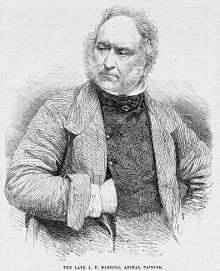 | |
| Born | 1795 London, England |
| Died | 1865 |
| Occupation | painter |
| Children | John Frederick Herring Jr. |
Life and work
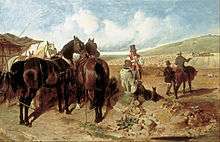
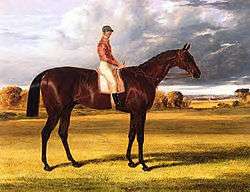
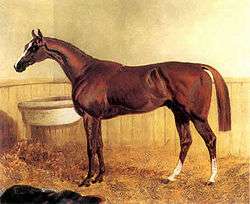
Herring, born in London in 1795, was the son of a London merchant of Dutch parentage, who had been born overseas in America. The first eighteen years of Herring's life were spent in London, where his greatest interests were drawing and horses.[2] In the year 1814, at the age of 18, he moved to Doncaster in the north of England, arriving in time to witness the Duke of Hamilton's "William" win the St. Leger Stakes horserace. By 1815, Herring had married Ann Harris; his sons John Frederick Herring Jr., Charles Herring, and Benjamin Herring were all to become artists, while his two daughters, Ann and Emma, both married painters. When she was barely of age in 1845 Ann married Harrison Weir.
In Doncaster, England, Herring was employed as a painter of inn signs and coach insignia on the sides of coaches,[3] and his later contact with a firm owned by a Mr. Wood led to Herring's subsequent employment as a night coach driver. Herring spent his spare time painting portraits of horses for inn parlors, and he became known as the "artist coachman" (at the time).[2] Herring's talent was recognized by wealthy customers, and he began painting hunters and racehorses for the gentry.
In 1830, John Frederick Herring, Senior left Doncaster for Newmarket, England, where he spent three years before moving to London, England.[2] During this time, Herring might have received tuition from Abraham Cooper. In London, Herring experienced financial difficulties and was given financial assistance by W. T. Copeland, who commissioned many paintings, including some designs used for the Copeland Spode bone china. In 1840-1841, Herring visited Paris, painting several pictures, on the invitation of the Duc d’Orleans (the Duke of Orleans), son of the French King Louis-Phillipe.
In 1845, Herring was appointed Animal Painter to the Duchess of Kent, followed by a subsequent commission from the ruling Queen Victoria, who remained a patron for the rest of his life.[2][3]
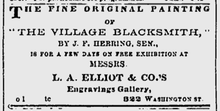
Late themes
In 1853, Herring moved to rural Kent in the southeast of England and stopped painting horse portraits.[3] He spent the last 12 years of his life at Meopham Park near Tonbridge, where he lived as a country squire. He then broadened his subject matter by painting agricultural scenes and narrative pictures, as well as his better-known sporting works of hunting, racing and shooting.
A highly successful and prolific artist, Herring ranks along with Sir Edwin Landseer as one of the more eminent animal painters of mid-nineteenth (19th) century Europe.[2] The paintings of Herring were very popular, and many were engraved, including his 33 winners of the St. Leger and his 21 winners of the Derby. Herring exhibited at the Royal Academy from 1818–1865,[3] at the British Institution from 1830–1865,[2] and at the Society of British Artists in 1836-1852, where Herring became Vice-President in 1842.[2]
See also
- George Stubbs - horse painter.
Notes
- Lane Fine Art: John Frederick Herring, Snr 1795-1865
- John Frederick Herring Sr. on Art.Net" (biography & selected works),
- John Frederick Herring Sr. (biography). Berger Collection (BCET) Berger Collection Educational Trust, 2006. Archived at Internet Archive.
- "John Frederick Herring Jr. (1820-1907)" (overview), Rehs Galleries, 2007, webpage: Rehs-JFH-Jr.
References
| Wikimedia Commons has media related to John Frederick Herring, Sr.. |
External links
- 173 paintings by or after John Frederick Herring Sr. at the Art UK site
- www.John-Frederick-Herring.org 208 works by John Frederick Herring Sr.